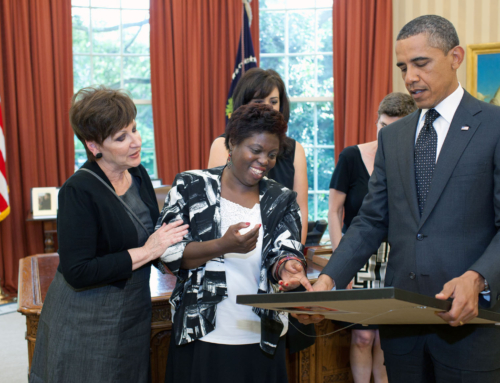Honoring National Disability Employment Awareness Month
Everyone deserves the right to employment opportunities, fair wages, and accessible work environments, so why is it that the unemployment rate for people with disabilities is still so high? As we recognize National Disability Employment Awareness Month (NDEAM), Easterseals Southern California is shining a light on the current state of employment for people with disabilities, with the goal of creating a better tomorrow.
This year’s NDEAM theme, set by the U.S. Department of Labor, is “Access to Good Jobs for All.” Despite a long history of furthering disability employment opportunities in the United States, there are still too many qualified and talented people with disabilities who are ready, willing and able to work that do not have access to jobs.
This October, help us spread the word about NDEAM to ensure people with disabilities’ limitless talents are being recognized so that everyone has access to fulfilling jobs every month of every year.
Easterseals at the Forefront of Disability Employment Rights

A disabled ex-serviceman working as a carpenter with the aid of a prosthetic arm, circa 1919. (Photo by FPG/Hulton Archive/Getty Images)
In 1918, Congress passed laws creating a rehabilitation program for World War I soldiers with disabilities Providing support for people with disabilities became more widespread, and it was in this environment that the Ohio Society for Crippled Children, which eventually became Easterseals, was founded one year later. Disabled World War II veterans once again raised public awareness around the movement, and in 1945, Congress enacted Public Law 176, establishing what we know today as National Disability Employment Awareness Month.

George H. W. Bush signing the Americans with Disabilities Act into law in 1990.
The disability rights movement achieved a major victory when President George H. W. Bush signed the Americans with Disabilities Act (ADA) into law in 1990. While this has led to increasing opportunities for people with disabilities, recent statistics show that there’s a lot more that must be done.
25 Years of the Olmstead Act
In 1999, the United States Supreme Court ruled in Olmstead v. L.C. & E.W. that states must provide services and programs for people with disabilities in community settings rather than institutions, based on their needs and preferences. The impact of the ruling led to strategies focused on integrating people with disabilities into all aspects of community living, including the right to self-determination in employment.
To celebrate the 25th anniversary of the Olmstead decision, the Office of Disability Employment Policy’s Leadership for the Employment of Americans with Disabilities (LEAD) Center has created this document that demonstrates the decision’s wide-ranging impact on policies and practices, illuminated by the stories of the people, agencies, and services that have been transformed by it.
Disability Employment Today
According to this report from the Centers for Disease Control and Prevention (CDC), one in four people in the U.S. have a disability. Additionally in 2023, Bureau of Labor Statics data showed that the unemployment rate for people with intellectual and developmental disabilities is at 7.2 percent, about twice as high as the rate for people without a disability.
Disabled Americans face various employment-related challenges such as being passed over for jobs they’re qualified for, making career transitions, and wage discrimination.
While people with disabilities have historically been underrepresented in the labor force, currently, there is much work being done by policymakers to change this. In September 2024, the federal government started the Federal Innovation Fund (FID), which will award $251 million to higher education institutions and other agencies to ensure that people with disabilities have access to good paying jobs. These grants focus on preparing individuals for competitive, integrated employment with good wages.
In 2023, California passed Senate Bill 639, which will eliminate subminimum wage for people with disabilities as of January 1, 2025, making California the 13th state to end this practice. This is a historic but overdue victory for disability rights in California as it will bring greater independence and opportunities for people with disabilities.
Easterseals Southern California’s Employment Services have always ensured individuals receive, at minimum, prevailing wage. A shining example of this is Jordan, who was supported by Easterseals Customized Employment to secure a fair-paying job that fit his skills and financial needs. He went from earning just $1.38 an hour through a previous program to $22 an hour, and now he has a fulfilling career that gives him confidence and purpose.
Jordan’s mom said, “We cannot tell you how much this job has meant to Jordan (and to us). His self-confidence has grown tremendously. He has tried other programs and none have come close to changing his life more than Easterseals Customized Employment. You did such a fabulous job of getting to know Jordan and placing him with a company that fit. We are so very grateful!”
Easterseals Continues to Advocate for Change
Easterseals Southern California is continually increasing awareness and employment opportunities for people with disabilities, especially through WorkFirst Employment Services. This service provides one-on-one, customized support and direct placement for people with disabilities and entering the workforce. We also offer specialized employment services to support individuals who have committed non-violent offenses through our NextPath program in the Orange County area.
To see Easterseals Employment Services in-action, check out our recent Story of Success video featuring Celestino. With the support of Easterseals, Celestino found a job that he loves and is thriving in his career as an electrical engineer at Western Train.
Easterseals Adult Day Services program is also supporting individuals in pursuing their career goals, like Michelle, who is currently enrolled in culinary school with the dream of becoming a chef.
Moving Forward to an Inclusive Future
As we look ahead to the future, we must challenge ourselves to increase awareness and provide employment opportunities for people with disabilities. Here are some key actions that we can take as individuals and as employers:
Increase Awareness:
-
Educate ourselves and others about disability inclusion
-
Share success stories of employees with disabilities
-
Promote disability awareness events and campaigns
Provide Employment Opportunities:
-
Implement inclusive hiring practices
-
Offer internships and apprenticeships
-
Partner with disability organizations like Easterseals for recruitment
Improve Accessibility
-
Incorporate universal design principles in workspaces
-
Ensure digital platforms and tools are accessible
-
Provide necessary accommodations for employees with disabilities
Implement the Disability Equality Index:
-
Use the DEI as a benchmarking tool
-
Set goals based on DEI results
-
Track progress and continuously improve disability inclusion efforts
You can find more information and resources about National Disability Employment Awareness Month by visiting the U.S. Department of Labor website .








Leave A Comment